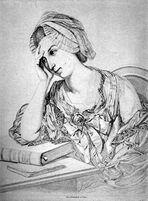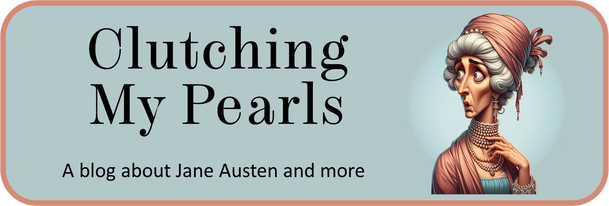| As soon as I had dispatched this letter, I drew my sword, and was about to plunge it into my heart! An intense fever seized me at the instant, and prevented me from committing the rash deed! I fell motionless on the bed, and remained some moments in the grasp of death! -- a sample of the prose! Of this book1 |
 I can't even
I can't even Ella Rosenberg is a semi-historical melodrama set amidst jealous and bickering German nobility. It’s a Romeo-and-Juliet tale about Harold, who rescues a girl from drowning when her carriage veers in to a canal. He promptly falls madly in love with her, and then he destroys her life. That is, he insists on pressing his suit, and will not listen to his father’s very good advice to establish his military career and grow up a bit, before he thinks about marrying. No, instead, Harold takes his dad’s money, goes AWOL, stalks Ella at her family’s country retreat, enrages her father, a powerful Baron, and pressures Ella to elope with him...
 Shelley-like behaviour
Shelley-like behaviour Is this a story about marrying for love instead of money? At first it appears so: the Baron “considered his daughter as an invaluable treasure, to be disposed of, like an article of merchandize, to the best bidder.” While Harold pleads and Ella agonizes, we have the lengthy interlude of the story of Julia and Hoffman, wherein a virtuous tenant farmer saves the lives of Julia and her noble mother and father, while her cowardly high-born fiancé runs away. Julia and Hoffman end up enjoying Love in a Cottage together.
By the way, Janeites will enjoy this tidbit, given to establish Ella's credentials as a lovely heroine: “her condescension made her idolized by a grateful tenantry, whose cottages she visited in person; and… when she entered the hovel of indigence or sickness... everywhere her footsteps left behind them the traces of pity and the balm of consolation.”
Ella eventually flees with Harold, after he threatens to kill himself, and it becomes immediately obvious that they haven’t thought things through. To be fair, the narrator says so as well, giving one of those "Take heed, young reader!" exhortations. Harold thought his uncle would take them in, but he refuses, because Ella's father is a powerful man. Ella now repents: “to you, have I sacrificed my peace and honor! My innocence and youth have this day been plunged into an abyss of shame, never to rise again! Complete your work—finish what you have began, and triumph over my virtue!"
Having no money (because Harold has managed to spend the 100 gold florins he took from his father) and no place to live, they do not consummate their relationship, and Harold wakes up in a rustic peasant's cottage to find Ella has left him to retire to a convent to atone for her filial disobedience.
 AI's conception of the anonymous commenter
AI's conception of the anonymous commenter Broken-hearted, Harold enlists in the army under an assumed name, and because he can’t make use of the fact that he’s actually the son of a Count, he is stuck without advancement for eight long years. By sheer chance, he finds Ella—Ella Rosenberg that is, because for some reason, Harold calls the woman he loves “Ella Rosenberg” through the entire novel--she is now a successful tragedienne, travelling about the country with a troupe of actors. And you know what that means, it means she’s a fallen woman, a painted doxy. Harold visits her in her dressing room and upbraids her for a few pages for being a strumpet and a floozy. “'O, Ella Rosenberg,' said I, 'you are, indeed, an object of pity! –-Into what an abyss do I see you plunged!—How could you thus, inconsiderately, overstep the boundary of virtue?... But, are you bound for ever to this disgraceful employment?—Is all lost—no hope left?—Is your heart—that heart which formerly was the abode of the most precious innocence, so corrupted, so sunken below its former state, that it cannot recover itself?'” And on and on in the same vein. It is at this point that an exasperated reader wrote: "Oh Harold, you blackguard" in the margin of the digitized copy of the novel I'm reading online.
Ella tearfully explains that no convent would admit her, and she was saved from utter destitution by a kindly lady who saw her by the side of the road and offered to pour the "balm of consolation" on her wounded spirit. She turned out to be not a panderer, as you might expect. "I soon found, with vexation, that her profession was that of a comedian." (Oh no!) So Ella went on the stage.
This is not good enough for our hero, who promptly attacks Ella’s lover when he comes to visit, and wouldn’t you know it, it’s his superior officer. That means he goes straight to a prison cell to await his execution.
| Enter the Abbott When Harold is led to the scaffold, Ella dramatically rushes up and swallows some poison and dies. This makes the crowd insist that he be reprieved, so back to prison he goes, where he is visited by an abbot who had once been a member of his mother’s household. The abbot conducts him to a lonely prison cell in Horsa, because someone, somewhere, has commuted his sentence. We learn all this from a letter written from the prison cell by the “wretched Harold” himself. The sequel then commences, and everything that happens hereafter is because of the tireless efforts of that abbot who just dropped into the novel on page 152 of Volume 2. After six months in prison, the “benign abbot” informs Harold that he’s free to go. The abbot has also succeeded in melting the obdurate heart of Baron Rosenberg; he blames himself for his daughter’s suicide. “O, I would give worlds to bring her back to life—to know she is not gone to prefer a filial curse against me at the bar of her heavenly parent!” Dying repentant, Baron Rosenberg gives “the estate at Dorflein” to Harold with his last breath and asks to be buried there beside his daughter. |
 Fancy meeting you here: Bing AI image
Fancy meeting you here: Bing AI image There is a brief gothic flicker when Harold, visiting the tomb of his beloved, sees what he thinks is a beautiful statue. But hey, it’s Ella! Ella Rosenberg, to be precise! Not dead! She'd only had a "dreadful fit!" The abbot knew this all along!
No doubt her father would have liked to have known that before he died of grief and remorse over his daughter being buried in unconsecrated ground. On the other hand, the baron was also a murderer, a plot point which the author threw into a parenthetical mid-sentence interjection (see above left, an excerpt from the abbot's monologue).
Let’s skip to the unexpected happy ending: "Thus, sir, I finish my eventful history… grateful, with Ella Rosenberg, to an All-wise Providence, for his goodness, which often permits the feet of the best to slip, but will not suffer them finally to fall!"
So, Ella not only supported herself for eight years, but she is repentant and redeemed from her floozy lifestyle, and becomes a virtuous matron. Possibly the author was able to get away with no harsher punishment for Ella because the tale is set in a foreign country, at some indeterminate time in the past. Otherwise, the critics (if the critics had noticed this novel) would have condemned it, I think, for more than lousy writing. The author actually anticipates criticism on this point, because in a footnote, he writes: “It may be reproachfully urged against the author, that he has made his Ella Rosenberg partly a vicious character; while, on the contrary, all Novel writers depict only the Heroine: but he has rather endeavoured to paint the weakness of nature: and he submits to the Reader, whether experience be not on his side." "Heroine" in that sentence implies a "picture of perfection."

Our current novel was “founded upon the famous [1807] melodrama of James Kenney, Ella Rosenberg,” according to pioneering scholar of gothic literature, Montague Summers. Well, except that it's very different. To be fair to Summers, he probably never got his hands on a copy of the novel back in 1941, in the pre-digital age.
Ella Rosenberg, the play, is a highly dramatic and emotional variation on King David and Bathsheba, in which a corrupt nobleman tries to destroy one of his officers so he can enjoy his beautiful wife. Virtue triumphs in the end, thanks to the local prince of whatever tinpot German principality the story is set in, and at Covent Garden the title role was played by no less than the great tragedienne Sarah Siddons. It’s such a pure melodrama that it’s rather fun to read. This novel, on the other hand, is funny for all the wrong reasons. But it's another example of how even young girls were expected to show agency in resisting the blandishments of their lovers.
I'm guessing the copycat name was done at the instruction of the publisher, JF Hughes, who was quite the unprincipled scamp. He published novels by "Mrs. Edgeworth" or "Caroline Burney" to trick people into thinking that the novel was by an Edgeworth or a Burney. He retitled a novel A Winter at Bath to imitate a rival publisher's A Winter in Bath. Perhaps the heroine originally had a different name like Friederike, and he said to the compositors: "replace the heroine's name with Ella Rosenberg" and they did the 18th-century version of "find and replace," and instead of "Ella" they always put in "Ella Rosenberg."
Previous post: Double feature: Margiana and Susan Next post: Elfrida, with an Austen connection
| "It appears essential to romance, that the scene it describes should either be remote from the times in which we live, or the people with whom we converse.” -- British Critic, speaking of a historical romance. 1797 |


 RSS Feed
RSS Feed